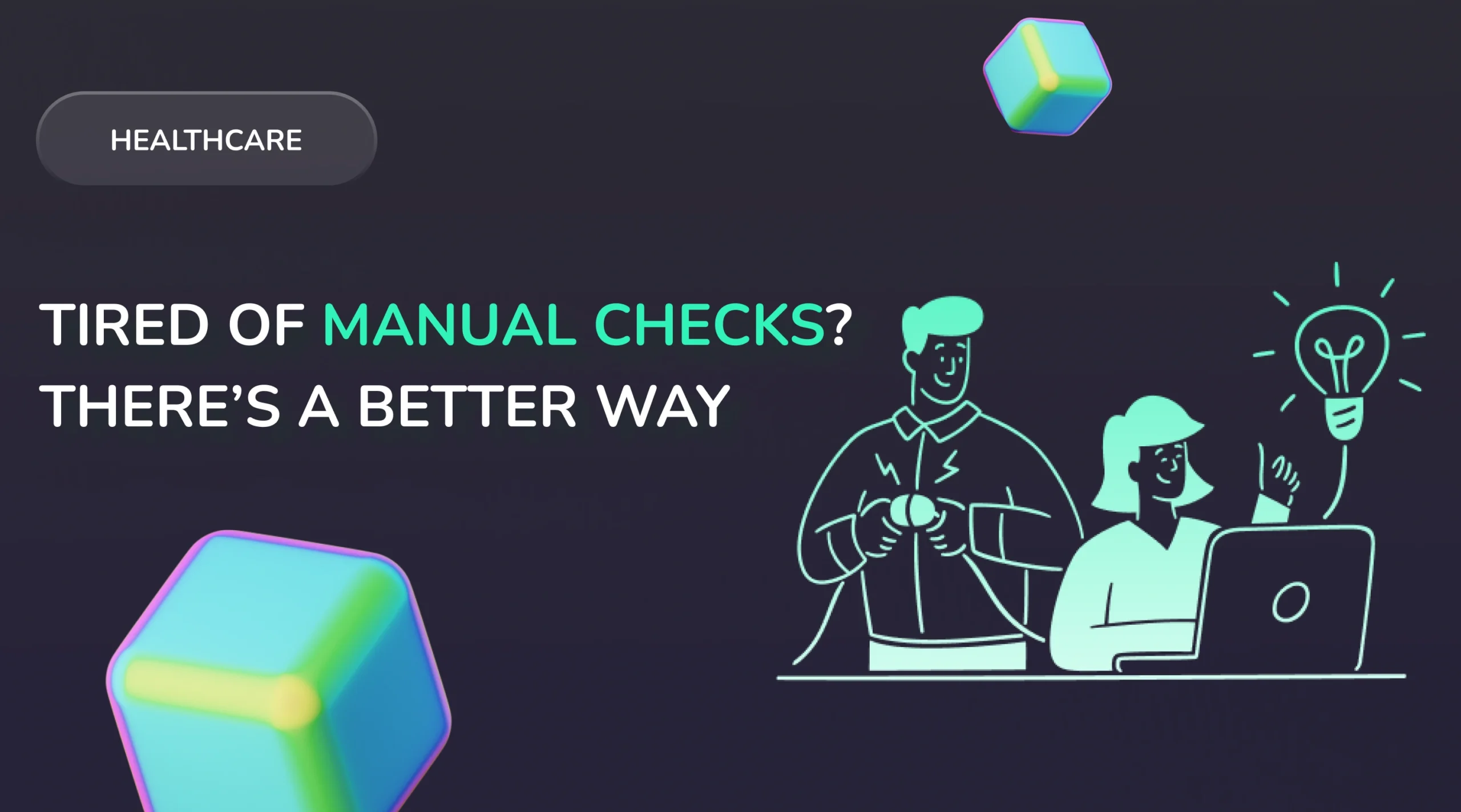
Why do doctors still spend up to 25% of their workday not treating patients, but logging into systems, resetting passwords, and jumping between applications? Why, even in 202,5, can you still hear in clinics, “I can’t get into the EHR, try rebooting the system”?
If you manage a digital healthcare product, you’ve likely already encountered this hidden growth blocker: a fragmented access system. And it’s not just about staff frustration or wasted minutes. It affects:
- The security of protected health information (PHI)
- The speed of clinical decision-making and HIPAA compliance
- And ultimately, patient trust and your business sustainability
When every system needs a separate login and employees rely on sticky notes, forgotten passwords, or colleagues for access, you lose money, control, and SSO cybersecurity.
This is exactly where SSO solutions become essential. Single Sign-On isn’t just about faster logins; it’s about building a secure, scalable, and seamless access experience across all systems, from EHRs to lab modules and telehealth platforms.
In this article, we’ll walk you through the most important insights on SSO for healthcare, including:
- What is the SSO’s meaning in medical, and why is it not just an IT issue but a strategic decision
- How healthcare SSO supports HIPAA compliance and protects PHI
- How enterprise SSO solutions reduce IT costs, lower human error, and improve staff satisfaction
- The difference between SSO and two-factor authentication, and how they work together
- A SSO software comparison to help you choose the right option for your clinic or hospital
- The best single sign-on solutions for small business and enterprise-level systems
And most importantly, why working with experts in SSO healthcare is critical if you want to build a secure and future-ready digital infrastructure, not just “add another login screen.”
Ready to see how SSO Medical can solve multiple business problems with one decisive move? Let’s dive in.
What is SSO in healthcare
Simply explained and to the point
Healthcare professionals face an overwhelming amount of work every day: dozens of systems and dozens of logins. Electronic Health Records (EHR), laboratory information systems, CRM, and Zoom for telemedicine each require a separate login.
And what do you think the result is?
Lost time, frustration, mistakes, and increased risks of unauthorized access to confidential information.
SSO (Single Sign-On) solves this problem. It is a technology that allows users to log in once and automatically gain access to all required systems without having to re-enter usernames and passwords.
When you log into your Google account, you instantly get access to Gmail, Google Docs, YouTube, and other services. That is SSO, but in healthcare, it connects not entertainment services, but critically essential systems.
What does SSO give to the healthcare business?
- Single point of entry: log in once and access everything
- Security: centralized access management and HIPAA compliance
- Time savings: fewer switches between systems and more time for patients
- Fewer mistakes: doctors do not get lost among passwords and systems
- Control and audit: all activity is logged and monitored through one system
How it works
| Step | What happens |
| 1. User logs in once | Through a secure system entry point |
| 2. SSO issues a session token | This token works for all connected systems |
| 3. Other systems automatically recognize the user | No need to re-enter the password |
SSO in healthcare is an additional tool to increase efficiency, security, and business resilience. You reduce IT support workload, minimize risks to PHI, and improve staff experience. This means your clinic or product works faster, safer, and more effectively.
Why healthcare without SSO is expensive and unsafe?
When a clinic or healthcare product utilizes a dozen different systems, ranging from EHRs to telemedicine platforms, the lack of centralized access is not just inconvenient; it poses a real business risk.
Every time a doctor or administrator enters a separate login and password, you lose not only seconds but also money, security, and efficiency.
What does this really cost?
Here is the real price of working without SSO:
| Problem | Real consequences |
| Multiple logins | Loss of up to 20–25% of staff time on system logins and password recovery |
| Forgotten passwords | Up to 30% of all IT support requests are about this |
| Access errors | Increased risk of entering data into the wrong system or misidentifying a patient |
| Reduced productivity | Staff fatigue, especially under a high workload |
| Security breaches | Employees write down passwords or share them, opening doors to data leaks |
Security risks are often overlooked
If you didn’t know, now is the time to realize that healthcare is one of the most vulnerable sectors to cyber threats. Unfortunately, the human factor is the primary cause of most data breaches. When employees have to remember dozens of passwords, they often look for shortcuts, such as writing them down on paper, reusing passwords across multiple accounts, or asking colleagues to log in under their own accounts. All of this leads directly to:
- Unauthorized access to PHI (protected health information)
- Violations of HIPAA standards
- Potential legal and financial consequences
- Loss of patient trust
Without centralized access management, you cannot:
- Quickly revoke access of a terminated employee
- Track who accessed sensitive information and when
- Ensure automatic logging and auditing of actions inside systems
All of this is critically important for healthcare organizations, especially when it comes to complying with HIPAA and protecting sensitive data.
Lack of SSO is not just a technical flaw. It results in daily losses, employee frustration, and a constant risk to the entire IT infrastructure. That is why healthcare SSO is not about comfort but about resilience and strategic security for your healthcare business.
SSO HIPAA and Data Security
How are they connected?
Any breach of medical information access is not just an internal incident; it is a serious matter. It carries serious consequences, ranging from substantial fines to the loss of one’s license. HIPAA standards strictly regulate who, when, and under what conditions can access Protected Health Information (PHI). Therefore, healthcare business products must not only store data securely but also control who has access to it and how.
SSO solutions play a key role in a secure access architecture.
How SSO helps comply with HIPAA:
| HIPAA Requirement | How SSO addresses it |
| Access control | SSO centralizes login management and access rights for all systems |
| User activity audit | SSO enables tracking who accessed what information and when |
| Secure login | Eliminates shared logins and manual password sharing |
| Session management | SSO automatically ends inactive sessions to reduce unauthorized access risk |
SSO and MFA are not competitors but partners
Many business owners confuse SSO software with MFA (Multi-Factor Authentication), thinking they must choose one or the other. In reality, these technologies work best together:
- SSO simplifies access by removing the need to enter credentials for each system
- MFA adds an extra protection layer, like SMS codes or biometrics
The combination of enterprise single sign-on solutions plus MFA meets the strictest HIPAA standards and reduces risks even if one security layer is compromised.
Why SSO reduces legal and financial risks
Cybersecurity analytics show that most PHI leaks happen due to uncontrolled access and human error. SSO solutions:
- Remove duplicate login points
- Prevent password reuse
- Log every user action within a unified system
This means that in the event of any incident, you can quickly provide a transparent audit, prove compliance with access policies, and avoid potential legal consequences.
If you develop a healthcare digital product, it’s essential to understand that healthcare SSO is not just a technical feature. It is a full-fledged tool for HIPAA compliance and protecting your business from serious risks. With increasing regulatory oversight, this becomes not a choice but a strategic necessity.
How SSO Works In a Healthcare Organization
When you manage a clinic or a healthcare SaaS product, it’s essential not only to know what SSO means medically, but also how it will work specifically for you. A key challenge is ensuring compatibility: connecting all systems seamlessly, from EHR and laboratory platforms to CRM and insurance services. The answer lies in well-built SSO solutions integration.
Systems that can be unified through SSO
Today, SSO software supports broad compatibility with major healthcare solutions, including:
- EHR (Electronic Health Records) such as Epic, Cerner, Meditech
Laboratory Information Systems (LIS), HL7 interfaces - PHR portals provide patients access to personal health records
- CRM and administrative platforms like Salesforce Health Cloud and clinical ERP
- Telemedicine solutions and cloud storage
All these systems can be accessed with a single login, eliminating the need for repeated authentication requests.
Support for hybrid architecture: cloud and on-premise
One of the most substantial advantages of modern enterprise SSO solutions for healthcare is the ability to work seamlessly with both on-premise and cloud-based systems.
| Environment | How SSO works |
| On-premise | Integration via internal Identity Providers (IDP), works even with limited internet access |
| Cloud | Supports OAuth2, SAML, OpenID — secure and flexible access from anywhere |
| Hybrid | Automatically detects the environment and routes the login through the appropriate gateway |
This is especially important for organizations where some systems are already in the cloud (e.g., telemedicine), while others still run on local servers (EHR, accounting).
What does this look like for doctors or staff?
A typical workday scenario with single sign-on healthcare:
- A doctor starts a shift and logs into one system, for example, at a workstation in the office
- From that moment, without additional logins, they can:
- Open a patient’s record in the EHR
- Review lab results
- Access CRM for interaction history
- Join a video call with a patient
All actions are tracked within a single, securely controlled session.
Without SSO, this process would take 3 to 4 times longer and require multiple logins and system switches.
Well-implemented healthcare single sign-on in a medical organization is not just about convenience; it also enhances security and efficiency. It means faster, safer, and more cost-effective workflows especially under heavy workloads, limited time, and the need for HIPAA compliance. For business owners, it’s a decisive step toward a resilient digital infrastructure.
SSO Benefits for Healthcare Business Owners
From Cost Savings to Patient Trust
Implementing Single Sign-On (SSO) is more than just improving the login experience for doctors and staff. It’s a direct investment in your healthcare organization’s efficiency, security, and scalability, helping you reduce costs, speed up operations, and build trust with patients.
- Lower Support and IT Costs
Statistics show that up to 40% of IT support tickets are related to password issues and login problems. With SSO, your team uses a single login for all systems, which significantly reduces these issues.
Here’s what you gain:
- Fewer support requests → lighter load on your helpdesk
- Less manual work → reduced operational costs
- IT team freed up → more time for strategic tasks
- Faster Workflows and Decision-Making
Healthcare professionals often lose valuable time logging into multiple systems. With SSO, they log in once at the start of their shift and get instant access to all necessary tools.
Benefits:
- Quicker access to patient data
- Less time lost switching between systems
- Faster clinical decisions and better care
- Enhanced Security and Patient Trust
In the medical field, data security is everything. A data breach can cost you more than just money; it can damage your reputation. SSO helps centralize access control, ensuring that only authorized users gain access.
Security advantages:
- Unified control over all access points
- Easy deactivation of access when staff leave
- Transparent login logs for audits and HIPAA compliance
- Scalable for Any Healthcare Business
SSO isn’t just for big hospitals. Whether you’re running a small clinic or a growing healthcare SaaS platform, there are scalable SSO solutions to match your needs.
| Type of Business | Best-fit SSO Solution |
| Small clinic or startup | Lightweight cloud-based SSO (e.g., OAuth, OpenID) |
| Clinic network or SaaS system | Enterprise-level SSO with Active Directory, SAML support, MFA, and custom integrations |
SSO isn’t just about convenience. It’s about building a stronger foundation for your digital ecosystem, saving money, improving speed, and protecting what matters most: your patients’ data. If you want your tech to support your growth instead of slowing it down, access architecture is the right place to start.
Why It’s Important to Work with Experts When Implementing SSO in Healthcare
At first glance, Single Sign-On (SSO) might seem like a simple solution “log in once and start working.” But in reality, it’s a complex system that involves sensitive access architecture, integration with medical platforms, and compliance with strict healthcare regulations. If you overlook essential technical details, what should be a cost-saving solution may quickly turn into expensive fixes and serious business risks.
The hidden challenges no one talks about at the beginning:
- Integration with medical systems (EHR, PHR, LIS):
Each healthcare platform has its own security protocols and authentication rules. Without proper experience, you risk disrupting the way your team is accustomed to working.
- Access rights and role-based models:
A doctor, assistant, accountant, and IT specialist should not have the same level of access. Your SSO system needs to “understand” who is who; otherwise, you could accidentally grant access to the wrong person.
- Audit and logging for HIPAA compliance
Limiting access is not enough. You also need clear and detailed logs that show who accessed what, and when. These logs are crucial during audits and inspections.
How to choose the right SSO solution? Not all of them are the same
| Question | Why It Matters |
| Does the system support both cloud and on-premise? | Most organizations work in hybrid environments |
| Is MFA and SAML/OAuth2 support built-in? | For a higher level of security |
| Can it be integrated with your specific EHR/CRM? | Not all SSO solutions are designed for healthcare platforms out of the box |
| Can it scale as your business grows? | Affects long-term value and total cost of ownership |
Without an expert in healthcare SSO, it’s hard to evaluate these aspects even if you’re tech-savvy.
What happens when you try to do everything on your own:
- System crashes or slowdowns
- Staff lose access to critical tools
- HIPAA violations and legal risks
- Data leaks and financial damage
- Frustration from doctors and patients
Eventually, many teams end up calling experts after things go wrong and fixing mistakes is always more expensive than doing it right from the start.
Wrapping up
SSO is a strategic technology, not just another plug-in. If you want it to actually support your business securely, efficiently, and in full compliance, don’t just install it. Trust professionals who know healthcare systems, security protocols, and regulatory demands. It’s an investment that pays off in trust, speed, and peace of mind.
Subscribe to our blog


